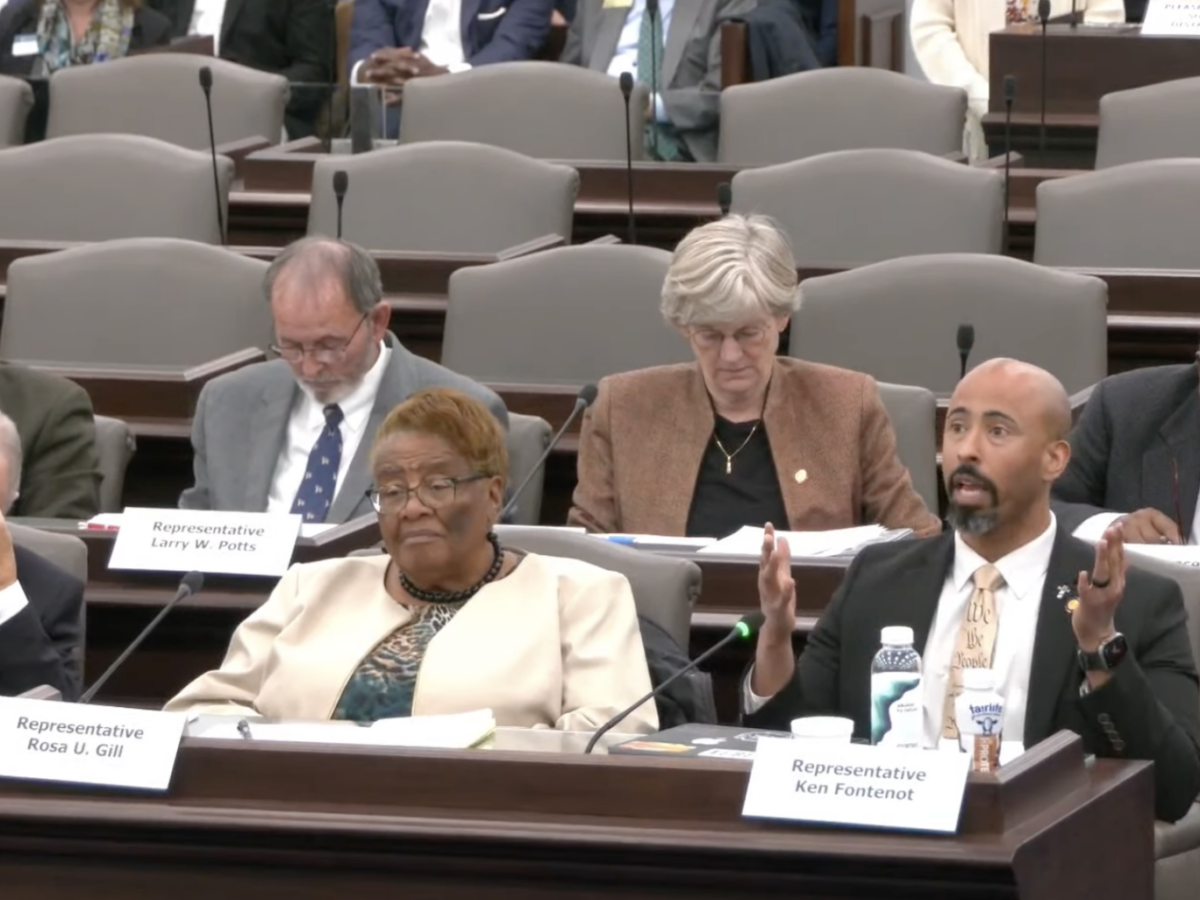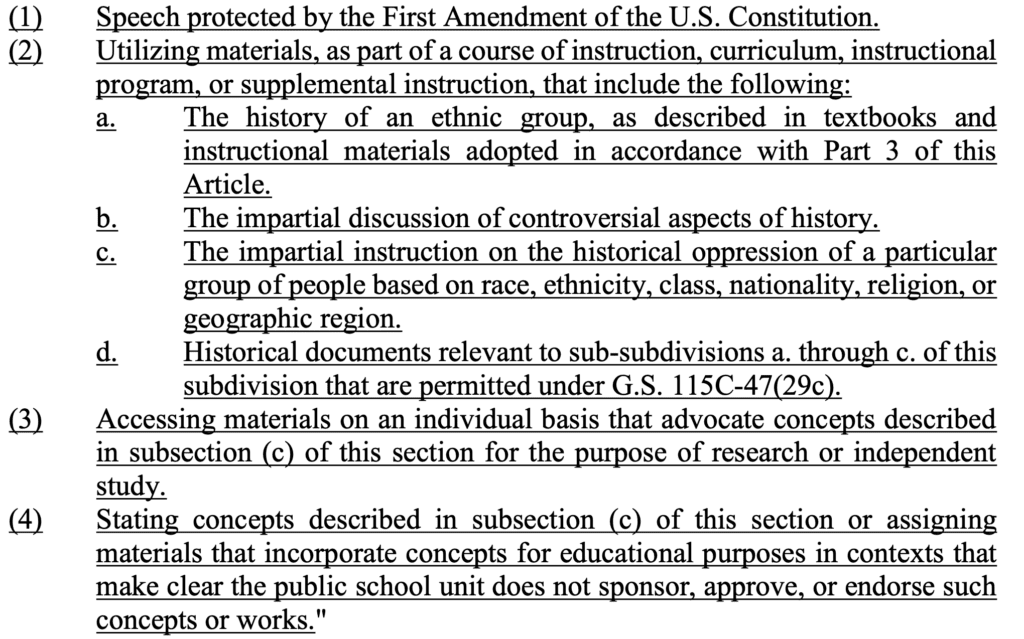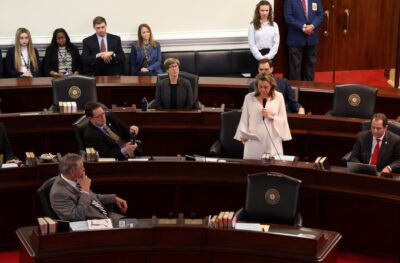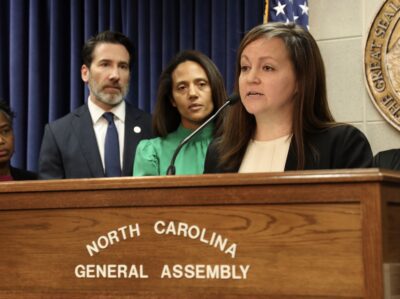

|
|
The House K-12 education committee Tuesday gave a favorable vote to a controversial bill opponents say restricts discussions of racism and muddies historical waters.
The bill would ban schools from promoting 13 concepts that Republican lawmakers say have no business in the classroom.
“We’re not just legislating for today or next week or next month. We’re legislating for many, many years to come,” said bill sponsor Rep. John Torbett, R-Gaston, a chair of the committee. “This bill does not change what history standards can and cannot be taught.”
House Bill 187, called “Equality in Education,” follows closely language from a bill that was passed in 2021 and vetoed by Gov. Roy Cooper. However, back then, Republican margins in the legislature were smaller and neither the House nor the Senate attempted to override the veto.
Things are different now. In the House, only one Democrat stands between Republicans and a veto override. In the Senate, Republicans have a veto-proof majority. So, assuming Cooper vetoes the bill, things could go differently this time around.
What’s in the bill?
The bill that passed the House education committee Tuesday contains 13 “concepts” that it says public school units shall not “promote.” They are:
- One race or sex is inherently superior to another race or sex.
- An individual, solely by virtue of his or her race or sex, is inherently racist, sexist, or oppressive.
- An individual should be discriminated against or receive adverse treatment solely or partly because of his or her race or sex.
- An individual’s moral character is necessarily determined by his or her race or sex.
- An individual, solely by virtue of his or her race or sex, bears responsibility for actions committed in the past by other members of the same race or sex.
- Any individual, solely by virtue of his or her race or sex, should feel discomfort, guilt, anguish, or any other form of psychological distress.
- A meritocracy is inherently racist or sexist.
- The United States was created by members of a particular race or sex for the purpose of oppressing members of another race or sex.
- The United States government should be violently overthrown.
- Particular character traits, values, moral or ethical codes, privileges, or beliefs should be ascribed to a race or sex or to an individual because of the individual’s race or sex.
- The rule of law does not exist, but instead is a series of power relationships and struggles among racial or other groups.
- All Americans are not created equal and are not endowed by their Creator with certain unalienable rights, including life, liberty, and the pursuit of happiness.
- Governments should deny to any person within the government’s jurisdiction the equal protection of the law.
The bill defines “promote” as compelling students, teachers, administrators, or other school employees to affirm or profess belief in the concepts described in the bill.
The revised bill also requires schools to make information available to the public at least 30 days prior to the following actions:
- “Providing instruction regarding concepts described in subsection (c) of this section in curricula, reading lists, seminars, workshops, trainings, or other educational or professional settings.”
- “Contracting with, hiring, or otherwise engaging speakers, consultants, diversity trainers, and other persons for the purpose of discussing concepts described in subsection (c) of this section.”
- “Contracting with, hiring, or otherwise engaging speakers, consultants, diversity trainers, and other persons who have previously advocated for the concepts described in subsection (c) of this section.”
The bill also says what is still allowed under the legislation:


History repeats itself
During debate on the bill back in 2021, much of the rhetoric around its contents had to do with critical race theory, though the words weren’t found anywhere in the bill back then or now. During a press conference prior to the release of the Senate version of the bill in 2021, Senate President Pro Tem Phil Berger, R-Rockingham, spoke at length about the rise of critical race theory in the United States and the need to combat it.
Critical race theory is an academic framework that argues that racism is systemic and embedded within the country’s institutions. Kimberlé Crenshaw, a founding critical race theorist, described critical race theory this way: “Critical race theory is a practice. It’s an approach to grappling with a history of white supremacy that rejects the belief that what’s in the past is in the past, and that the laws and systems that grow from that past are detached from it.”
Rep. Ken Fontenot, R-Nash, called out critical race theory by name during committee debate Tuesday, calling it “a false narrative.”
“It is a one-way racism that leaves the impression that those who are Caucasian are inherently against African Americans,” he said.
Rep. Julie von Haefen, D-Wake, said teachers are concerned about how the bill will be implemented and what the implications of its passage are for them.
“How does … a teacher distinguish between what is and is not prohibited by this legislation, and who is going to be enforcing that?” she asked.
Torbett said there is no real enforcement, but that teachers’ principals should be able to give guidance.
Von Haefen also asked if schools and districts are now going to have to invest in background checks every time they want to bring in a speaker.
“Certainly you don’t think we should allow people to come in and teach … without checking their background,” Torbett responded.
Rep. David Willis, R-Union, said that his children’s teachers already provide transparency in their teaching materials, and that he expects teachers to have vetted the material they plan to use with children.
“We know as a nation we have good, bad, and ugly. And I want my children to understand all of that,” he said. “We’re asking not to politicize this, but to un-politicize this.”
Rep. Marcia Morey, D-Durham, said that learning about subjects in history can make students uncomfortable, but that is not a reason to avoid talking about it. Subjects in the history of the United States, like lynchings, the Jim Crow South, and slavery, are essential things for students to understand, she said.
“A sound basic education is a full discussion of the facts of racism in American history,” she said.
Additionally, she said she worries about the chilling effect this bill could have on teachers who self-censor out of fear of crossing its boundaries.
“I just want to say we teach things that are uncomfortable in our schools for a robust discussion,” she said. “It’s how we learn about good and evil.”
What are others saying?
The Dudley Flood Center for Educational Equity and Opportunity, along with the Public School Forum of North Carolina, issued a statement in opposition to the bill before it was heard in committee Tuesday.
“HB 187 would limit educators’ ability to discuss the reality of racism in the United States, would restrict students’ engagement with history and current events, and would hinder districts’ efforts to understand and tackle the root cause of inequities in our schools,” the statement read. “We must ask — what problem is actually being solved through this legislation? How does this legislation promote equality when it inherently discriminates against certain groups or topics? The only way to truly achieve equality is to bravely and honestly reckon with our country’s complicated past and present.”
Read the full statement here.
In addition, the Durham Board of Education passed a resolution in opposition to the bill last week, which reads in part:
“These bills are partisan, divisive, and are the result of coordinated work by the American Legislative Exchange Council (ALEC) and the Heritage Foundation, and … HB 187 attempts to restrict and prohibit honest conversations about race, conflicting with existing state and local education standards, and infringing on the free speech rights of students, educators, and staff, although the bill states that it cannot violate freedom of speech rights.”
Read the whole resolution here.
The bill goes now to the House Rules Committee.





